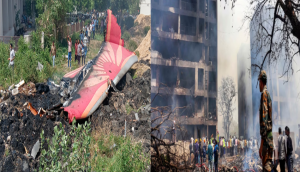
US President Joe Biden on Wednesday morning (local time) told Israel Prime Minister Benjamin Netanyahu that he expects "significant de-escalation today" in the Israel-Hamas conflict, adding to the growing international pressure to end the fighting.
According to The New York Times, " Biden told Prime Minister Benjamin Netanyahu on Wednesday that he expected a significant de-escalation today on the path to a cease-fire in the conflict between Israel and Hamas, the White House principal deputy press secretary told reporters onboard Air Force One."
"Our focus has not changed," the press secretary, Karine Jean-Pierre, said. "We are working towards a de-escalation."
Jean-Pierre said President Biden wanted the situation to reach a "sustainable calm," reported The New York Times.
She said the call, which came before the president departed from Washington to address graduates at the United States Coast Guard Academy on Wednesday morning, did not reflect a shift in administration policy as it pertains to a cease-fire.
"This is what we have been calling for the past eight days," she said.
However, the Israeli PM did not assure of any such claim of "cease-fire" made by the US President, according to a senior administration official who received a readout of the call shortly after it happened, reported by The New York Times.
After visiting Israeli military headquarters, Netanyahu said he was "determined to continue this operation until its aim is met."
Still, the president's call to the Israeli leader added to a growing chorus of international parties urging the Israeli military and Hamas militants to lay down their weapons as the conflict stretched into its 10th day.
France is leading efforts to call for a cease-fire at the United Nations Security Council, but it remains unclear when a resolution will be put to a vote.
Israel and Hamas have signalled a willingness to reach a cease-fire, diplomats privy to the discussions say, but that has not reduced the intensity of the deadliest fighting in Gaza since 2014.
At least 227 people in Gaza have been killed, including 64 children, and 1,620 have been wounded as of Wednesday afternoon, according to the Gaza health ministry. Israeli airstrikes and shelling have destroyed or damaged homes, roads, and medical facilities across the territory.
Hamas militants continued to fire rockets into Israeli towns on Wednesday, sending people scurrying for shelter. More than 4,000 rockets have been fired from Gaza since the conflict began, according to the Israeli military, killing at least 12 Israeli residents.
As Egypt, Qatar and the United Nations mediated talks between Israel and Hamas, the two adversaries indicated publicly that the fighting could go on for days. Netanyahu tweeted on Tuesday that the attacks against Hamas would "continue as long as necessary to restore calm to the citizens of Israel."
A senior Hamas official denied reports that the group had agreed to a cease-fire but said that talks were ongoing, reported the New York Times.
Still, with Israeli warplanes firing into the crowded Gaza Strip, in a campaign that Israeli officials say is aimed at Hamas militants and their infrastructure, the humanitarian crisis has deepened for the two million people inside Gaza.
The United Nations said that more than 58,000 Palestinians in Gaza had been displaced from their homes, many huddling in U.N.-run schools that have in effect become bomb shelters. Israeli strikes have damaged schools, power lines, and water, sanitation and sewage systems for hundreds of thousands of people in a territory that has been under blockade by Israel and Egypt for more than a decade. Covid-19 vaccinations have stopped, and on Tuesday an Israeli strike knocked out the only lab in the territory that processes coronavirus tests.
"There is no safe place in Gaza, where two million people have been forcibly isolated from the rest of the world for over 13 years," the U.N. emergency relief coordinator in the territory, Mark Lowcock, said in a statement.
(ANI)







![BJP's Kapil Mishra recreates Shankar Mahadevan’s ‘Breathless’ song to highlight Delhi pollution [WATCH] BJP's Kapil Mishra recreates Shankar Mahadevan’s ‘Breathless’ song to highlight Delhi pollution [WATCH]](https://images.catchnews.com/upload/2022/11/03/kapil-mishra_240884_300x172.png)

![Anupam Kher shares pictures of his toned body on 67th birthday [MUST SEE] Anupam Kher shares pictures of his toned body on 67th birthday [MUST SEE]](https://images.catchnews.com/upload/2022/03/07/Anupam_kher_231145_300x172.jpg)



_in_Assams_Dibrugarh_(Photo_257977_1600x1200.jpg)


